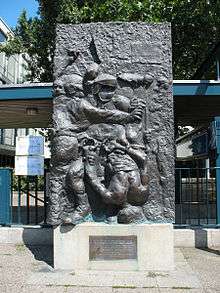Benno Ohnesorg
| Benno Ohnesorg | |
|---|---|
 Relief Der Tod des Demonstranten (The Death of the Demonstrator) by Alfred Hrdlicka; Location: Deutsche Oper Berlin, forecourt | |
| Born |
October 15, 1940 Hanover |
| Died |
June 2, 1967 (aged 26) Berlin |
| Alma mater | Freie Universität Berlin |
| Occupation | Student |
Benno Ohnesorg (German pronunciation: [ˈbɛno ˈʔoːnəzɔɐ̯k], October 15, 1940 – June 2, 1967) was a German university student killed by a policeman during a demonstration in West Berlin.
Death
On June 2, 1967, Ohnesorg participated in a protest held near the Deutsche Oper, aimed against the state visit of the Shah of Iran, Mohammad Reza Pahlavi, who was attending a performance of Mozart's The Magic Flute at the Deutsche Oper that night. It was the first political demonstration in which Ohnesorg had ever taken part.
The protest turned violent after provocations by the Shah's agents and police overreactions. Demonstrators were then dispersed into the side streets. In the courtyard of Krumme Strasse 66, Ohnesorg was then shot by plain-clothes police officer Karl-Heinz Kurras. Ohnesorg died before he could be treated at a hospital. At that time, Kurras was cleared of all charges in two separate trials.[1]
Ohnesorg was a student of Romance and German studies. He was married and his wife was pregnant with their first child.
Re-investigation
More than forty years later, it was revealed that Kurras was an undercover agent of the East German secret police Stasi, and a long-time member of the Socialist Unity Party of Germany, the ruling East German Communist party; however, the motive behind Kurras' act remains unclear.[2][3][4]
The surviving Stasi archives contain no evidence that Kurras was acting under their orders when he shot Ohnesorg.[5][6]
In January 2012, research carried out by federal prosecutors and Der Spiegel magazine has found that the shooting was not in self-defense as always claimed by Kurras and that it was certainly premeditated. Newly examined film and photographic evidence also implicate fellow officers and superiors, demonstrating that the police covered up the truth in subsequent investigations and trials. Additionally, medical staff who carried out the postmortem on Ohnesorg were ordered to falsify their report. However, the new information is unlikely to be sufficient for the case to be reopened.[7]
Legacy
His death served as a rallying point for the left wing, and the Movement 2 June group was named after the day of his death. After student activist Rudi Dutschke called for direct action in response for the killing, Jürgen Habermas famously invoked the term "left fascism" against elements within the student movement. The left-wing student movement of the late 1960s that swelled and partly radicalised itself after Ohnesorg's death influenced a large number of German politicians who were in their teens and twenties at the time.
A monument next to the Deutsche Oper Berlin, which was designed by Austrian sculptor Alfred Hrdlicka, serves as a memorial for the killing. In December 2008, municipal authorities inaugurated an official memorial panel on the sidewalk in front of the house where Ohnesorg was shot. The panel is in German and English (see external links below).[1]
In Ohnesorg's hometown of Hanover, a bridge over the Ihme river is named after him.
In film
The introduction of the 2008 film Der Baader Meinhof Komplex shows Ohnesorg's death (he is played by Martin Glade).
See also
References
- 1 2 Official Berlin website, memorial panels in Berlin-Charlottenburg
- ↑ Stasi-Mitarbeiter erschoss Benno Ohnesorg
- ↑ East German Spy Shot West Berlin Martyr
- ↑ 1968 REVISITED: The Truth about the Gunshot that Changed Germany
- ↑ Spy Fired Shot That Changed West Germany
- ↑ Bild.de with photo gallery of the event as well as of Kurras and Ohnesorg
- ↑ "Police Covered Up Truth Behind Infamous Student Shooting". SPIEGEL ONLINE international. 2012-01-23. Retrieved 2012-02-25.
External links
- Photograph of Benno Ohnesorg's death (German Historical Museum)[broken link]
- The Truth about the Gunshot that Changed Germany (SPIEGEL ONLINE)
- Official memorial panel erected by Berlin, in German and English (Berlin.de)